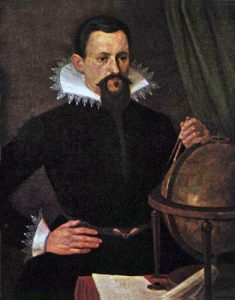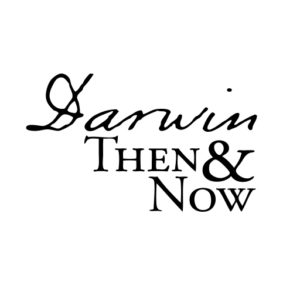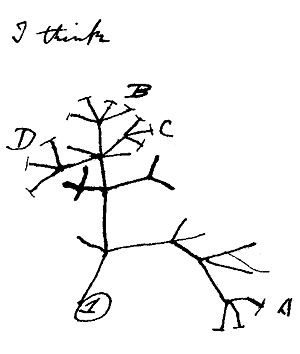 New Jersey U.S. Representative Rush Holt, a Democrat, introduced on the House floor a resolution to designate Charles Darwin’s birthday, February 12th, as a national holiday. In a Huffington Post interview, Holt said the day should symbolize “the importance of science in the betterment of humanity.”
New Jersey U.S. Representative Rush Holt, a Democrat, introduced on the House floor a resolution to designate Charles Darwin’s birthday, February 12th, as a national holiday. In a Huffington Post interview, Holt said the day should symbolize “the importance of science in the betterment of humanity.”
“It was his thirst for knowledge,” Holt continued, “and his scientific approach to discovering new truths that enabled him to develop the theory of evolution.” Fortunately, most of the representatives doubted Holt’s assertions. In the U.S. courts, however, evolution by natural selection is a proven scientific theory. Known as the “father of evolution,” Darwin must have been an exceptional scientist. For good reasons to be discussed, however, the answer to “Was Darwin a scientist?” is one of the evolution industry’s best back-story secrets.
Scientific Revolution
By Darwin’s lifetime in the nineteenth century, the scientific revolution had generated countless cultural and scientific breakthroughs. Western civilization was on an unprecedented march towards progress.
Beginning with Nickolas Copernicus (pictured right) in the sixteenth century, emerging principles of science guided the world from the Age of Reason, sometimes known as the Age of Enlightenment, into the Scientific Revolution. 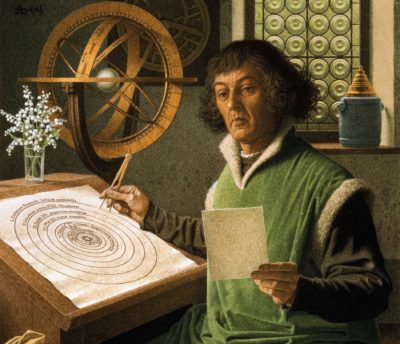
Erroneous perceptions about the universe abounded before Copernicus, such as the idea that the Earth is the center of the universe and is flat. These views originated from Greek philosophy and logical deductive reasoning, known as natural philosophy, popularized by Aristotle (384 – 322 BC), a Greek philosopher.
The prevailing view was that the Sun rotated around the Earth. What Copernicus observed, however, seemed just the opposite. He developed a new theory using what has since emerged as the principles of science. Science is from the Latin word scientia, meaning “knowledge.”
These principles launched the revolution. The defining boundary drawn around these principles is inductive reasoning based exclusively on objective evidence, along with the exclusion of deductive reasoning and any element of subjectivity. A new era in human history had just begun.
The scientific method operationalizes these principles and tests the validity of a proposed theory. The steps of the technique include identifying relevant physical evidence, measuring it, organizing it, testing it, and re-testing it. Over time, many of the “mysteries of the universe” gained a scientific explanation, one by one.
In 1609, Johannes Kepler, a German mathematician and astronomer, discovered the Laws of Planetary Motion by employing the principles of science and using the scientific method. By mid-century, Francis Bacon, a leading advocate of the principles of science, co-founded the Royal Society of London.
Using the principles of science opened the doors to the secrets of nature. The Royal Society is still the world’s oldest national scientific institution, one that Darwin knew well. But was Darwin a scientist?
“Beyond the Bounds”
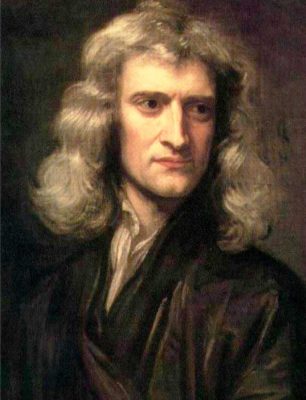 Many of Darwin’s colleagues were members of the Royal Society. Science surrounded Darwin. Although Sir Isaac Newton (pictured left) lived a century earlier, Darwin started and ended The Origin by “genuflecting to the legacy of Newton,” as described by ScienceDirect. Newton served as President of the Royal Society from 1703 to 1727. But was Darwin a scientist?
Many of Darwin’s colleagues were members of the Royal Society. Science surrounded Darwin. Although Sir Isaac Newton (pictured left) lived a century earlier, Darwin started and ended The Origin by “genuflecting to the legacy of Newton,” as described by ScienceDirect. Newton served as President of the Royal Society from 1703 to 1727. But was Darwin a scientist?
Although the Scientific Revolution undermined the value of natural philosophy along with the practices of ancient Greek medicine, strong ties to the past continued. Just two years before the publication of The Origin of Species, in a letter to Asa Gray at Harvard University, Darwin surprisingly answered –
“I am quite conscious that my speculations run quite beyond the bounds of true science.”
Was Darwin a scientist? No. Philosophy, not science, drove Darwin. In a letter to a colleague, Henry Fawcett. Darwin undermines the principles of science by advocating the use of bias –
“How odd it is that anyone should not see that all observations must be for or against some view if it is to be of any service.”
“The Old Belief”
Even though a graduate of Christ College (pictured left) at Cambridge University, Darwin slowly began to question the biblical account. By 1859, he viewed Genesis as –
“The old belief in the creation of species from the dust of the ground.”
His early disenchantment accelerated; “the old belief” eventually gave way later in life to vilification. As Darwin recorded in his Autobiography –
“I can hardly see how anyone ought to wish Christianity to be true… This is a damnable doctrine.”
His cynicism of “the old belief,” interestingly, paralleled his emerging disregard for the principles of the scientific revolution. In an 1857 letter to Alfred Russel Wallace, Darwin contended –
“I am a firm believer that without speculation, there is no good and original observation.”
While analyzing and agonizing over dismissing the principles of science, in a letter to his wife Emma, Darwin weighed the pros and cons –
“It is a fatal fault to reason whilst observing, though so necessary beforehand and so useful afterwards.”
Perhaps triggered by the sudden death of his daughter, Annie, in 1851, Darwin drifted further. In the book entitled Darwin, The Life of a Tormented Evolutionist, Adrian Desmond and James Moore explain –
“This was the end of the road [Annie], the crucifixion of his hopes.”
At the time, a new liberal social movement was emerging, attempting to undermine the scientific method, led by Herbert Spencer—many of Darwin’s colleagues aligned with this movement, even some members of the Royal Society.
Philosophy vs. Science
As Darwin continued to wander from the principles of science, deductive reasoning increasingly replaced inductive reasoning. When American naturalist Asa Gray inquired, Darwin replied –
“What you hint at generally is very, very true: that my work is grievously hypothetical, and large parts are by no means worthy of being called induction, my commonest error being probably induction from too few facts.”
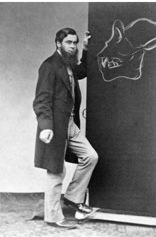 The philosophy vs. science debate strengthened. Was Darwin a scientist? Like Spencer, Thomas Huxley (pictured left), an English biologist and anthropologist, contended for a return to natural philosophy. Later becoming best known as Darwin’s “bulldog,” Huxley sent the following encouraging letter to Darwin a few days after The Origin was released, arguing –
The philosophy vs. science debate strengthened. Was Darwin a scientist? Like Spencer, Thomas Huxley (pictured left), an English biologist and anthropologist, contended for a return to natural philosophy. Later becoming best known as Darwin’s “bulldog,” Huxley sent the following encouraging letter to Darwin a few days after The Origin was released, arguing –
“Those who refuse to go beyond fact rarely get as far as fact; and anyone who has studied the history of science knows that almost every great step therein has been made by the ‘anticipation of nature,’ that is, by the invention of hypothesis which, though verifiable [sic], often had minimal foundation to start with; and not infrequently, despite a long career of usefulness, turned out to be wholly erroneous in the long run.”
Like Huxley, John Stuart Mill, one of England’s most influential thinkers in the history of classical liberalism, encouraged Darwin to abandon the principles of science. Following the publication of The Origin, Mill wrote that it was “in the most exact accordance with the strict principles of logic” – philosophy, not science. He should know.
David L Hull, a science historian at Indiana University, gives the following twentieth-century perspective to the debate –
“[on] closer examination, however, Mill’s endorsement can be seen to be not nearly reassuring. Darwin had properly used the Method of Hypothesis, but this method belonged to the logic of discovery, not proof. Despite twenty years of labor, Darwin had failed to provide proof for his theory of evolution.”
Darwin’s famous “I Think” tree of life sketch (pictured above) is tail telling. Darwin’s dilemma intensifies.
What Darwin Said
Never asserting to be a scientist or an adherent to the principles of the scientific revolution, not surprisingly, then, The Origin contains no measured physical evidence, calculations, charts, tables, testing, results, or re-.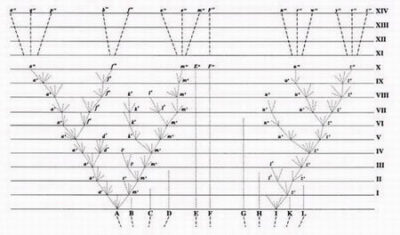 Testing, not to mention a single testable theory-based prediction. The only graph in The Origin (pictured right) does not include any supporting objective evidence.
Testing, not to mention a single testable theory-based prediction. The only graph in The Origin (pictured right) does not include any supporting objective evidence.
Rather than providing supporting physical evidence, Darwin includes a disclaimer in nearly every chapter. Even in the Introduction, Darwin gives a cautionary note –
“I am well aware that scarcely a single point is discussed in this volume on which facts cannot be adduced, often apparently leading to conclusions directly opposite to those at which I have arrived.”
In the words of Darwin, the book is “one long argument.” The Origin advances a philosophy, not a valid scientific theory.
Consensus
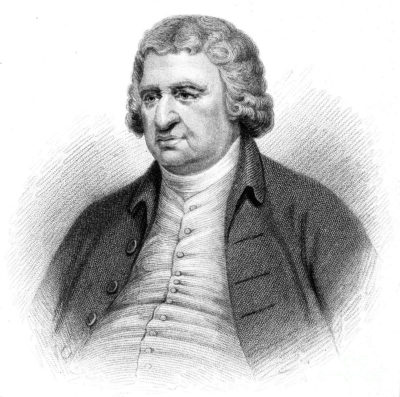 Leaving the principles of science, The Origin reflected the natural philosophy perspective developed by his grandfather, Erasmus Darwin (picture left), in his book entitled Zoonomia (1794). As Nora Barlow, Darwin’s granddaughter, points out in the Foreword of his Autobiography –
Leaving the principles of science, The Origin reflected the natural philosophy perspective developed by his grandfather, Erasmus Darwin (picture left), in his book entitled Zoonomia (1794). As Nora Barlow, Darwin’s granddaughter, points out in the Foreword of his Autobiography –
“The facts are useless without the frame of the theory to receive them.… For Darwin came to believe that the value of fact-finding lies solely in relation to theory.”
Francis Darwin, Darwin’s son, also understood Darwin’s fond disregard for the principles of science. As Francis explains –
“He said that no one could be a good observer unless he were an active theorizer.”
Disrespect for the principles of science continued throughout his life. Darwin urged others similarly. In a letter to John Scott in 1863, Darwin advocated jury-rigging the observation process –
“I would suggest to you the advantage… let [the] theory guide your observations.”
Darwin uses natural philosophy consistently throughout The Origin. A theory, he argues, should be “grounded” through “inference” and not through facts, the antithesis of the principles of science –
“All the organic beings which have ever lived on this Earth may be descended from … one primordial form. But this inference is chiefly grounded on analogy.”
To directly answer our original question: “Was Darwin a scientist?” even Darwin would say “no.”
Darwin began his career by applying the scientific method and was later elected a fellow of the Royal Society. However, the re-emerging influence of the Enlightenment caused Darwin to abandon the scientific method. The article “Logic and Science” provides insight into Darwin’s transformation.
Genesis
The congressional house did not gain enough votes to pass Holt’s resolution. “Darwin Day” as a symbol of “the importance of science” is an inanely baseless assertion. Objective evidence amassed using the principles of science, despite Darwin’s insistence otherwise, continues to be compatible with the Genesis account written by Moses.
In the words of Johannes Kepler (1571-1630), during the Scientific Revolution –
“I thank Thee, my Creator and Lord, that Thou hast given me this joy in Thy creation.”
Studying Charles Darwin’s biography gives critical insights into his motivations for developing his theory of natural selection.
Was Darwin a Scientist? is a Snapshot Biography of Charles Darwin article.
Darwin Then and Now is an educational resource on the intersection of evolution and science, highlighting the ongoing challenges to the theory of evolution.
Move On
Explore how to understand twenty-first-century concepts of evolution further using the following links –
-
- The Understanding Evolution category showcases how varying historical study approaches to evolution have led to varying conclusions. Subcategories include –
- Studying Evolution explains how key evolution terms and concepts have changed since the 1958 publication of The Origin of Species.
- What is Science explains Charles Darwin’s approach to science and how modern science approaches can be applied for different investigative purposes.
- Evolution and Science feature study articles on how scientific evidence influences the current understanding of evolution.
- Theory and Consensus feature articles on the historical timelines of the theory and Natural Selection.
- The Biography of Charles Darwin category showcases relevant aspects of his life.
- The Glossary defines terms used in studying the theory of biological evolution.
- The Understanding Evolution category showcases how varying historical study approaches to evolution have led to varying conclusions. Subcategories include –

